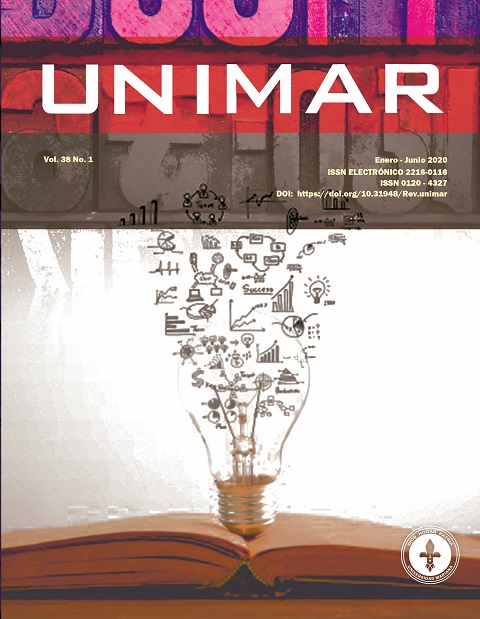Academic relationship of teachers and the domain of ICT
DOI:
https://doi.org/10.31948/Rev.unimar/unimar38-1-art6Keywords:
teacher competences, teacher training, information technology, educational technologyAbstract
To establish the degree of use and appropriation of information and communication technologies and the educational level of teachers, a survey of closed reagents was applied to a sample of twenty teachers from the Santander General Educational Institution of the municipality of Soacha, Cundinamarca. Twelve survey questions related to the use and appropriation of TIC were analyzed, twelve research hypotheses were worked and the information was processed in SPSS, with a Chi-square test for the hypotheses. The correlational analysis regarding the use and appropriation of ICT by teachers showed that there is no relationship between their educational level and their relationship between the domain of ICT. In addition, a high correlation was evidenced in large part between the educational level of teachers and their relationship between the domain of ICT.
Author Biography
Jorge Enrique Díaz-Pinzón, Secretaría de Educación de Soacha
Magíster en Gestión de la Tecnología Educativa. Especialista en Administración de la Informática Educativa. Ingeniero Agrónomo. Docente titular de Matemáticas e Investigador Secretaría de Educación de Soacha, Cundinamarca, Colombia.
References
Acuña, E. (2004). Análisis de Datos Categóricos. Recuperado de https://academic.uprm.edu/eacuna/miniman8sl.pdf
Albert, M. J. (2006). La investigación educativa. Claves teóricas. Madrid, España: McGraw-Hill.
Anónimo. (s.f.). Gráfico de superficie. Recuperado de https://es.scribd.com/doc/6894116/Grafico-de-superficie.
Díaz, J. (2017a). Conocimiento y apropiación de las tecnologías de la información y la comunicación (TIC) en la formación docente. Actualidades Pedagógicas, (69), 121-131. https://doi.org/10.19052/ap.4066
Díaz, J. (2017b). Importancia de la simulación Phet en la enseñanza y aprendizaje de fracciones equivalentes. Revista Educación y Desarrollo Social, 11(1), 48-63. https://doi.org/10.18359/reds.2011
Díaz, J. (2017c). Formación de docentes en el uso y apropiación de las TIC. Innova Research Journal, 2(9), 18-25. https://doi.org/10.33890/innova.v2.n9.2017.257
Díaz, J. (2018). Aprendizaje de las Matemáticas con el uso de simulación. Sophia, 14(1), 22-30.
Espinosa, H., Restrepo, L. y Aránzazu, D. (2016). Desarrollo de habilidades digitales docentes para implementar ambientes virtuales de aprendizaje en la docencia universitaria. Sophia, 12(2), 261-270. https://doi.org/10.18634/sophiaj.14v.1i.519 https://doi.org/10.18634/sophiaj.12v.2i.561
Lind, D., Marshal, W. y Mason, R. (2015). Estadística para administración y economía. Recuperado de http://www.docfoc.com/estadistica-para-administracion-lind-marchal-pdf
Gil, J. Rodríguez, G. y García, E. (1995). Estadística básica aplicada a las Ciencias de la Educación. Sevilla, España: Editorial Kronos.
Khan, S. H. (2012). Integration of ICT component in teacher educational institutions: An unavoidable step towards transforming the quality of present teacher education system. Indian Streams Research Journal, 1(5).
Llorente, J., Giraldo, E. y Toro, S. (2016). Análisis del uso de las tecnologías TIC por parte de los docentes de las Instituciones educativas de la ciudad de Riohacha. Recuperado de https://www.redalyc.org/jatsRepo/737/73749821005/html/index.html#redalyc_73749821005_ref5
Ministerio de Educación Nacional. (MEN). (2014). Formación Docente para la calidad Educativa. Recuperado de https://www.mineducacion.gov.co/1759/w3-propertyvalue-48472.html?_noredirect=1
Miranda, M., Morales, V. y Morales, D. (2020). Emprendimiento innovador: análisis internacional comparado. Epísteme, Revista Digital de Ciencia, Tecnología e Innovación, 7(3), 192-206
Parra, E. y Pincheira, R. (2017). Integración curricular de las TIC. Recuperado de https://www.oas.org/cotep/GetAttach.aspx?lang=es&cId=412&aid=707
Plan Nacional Decenal de Educación PNDE (2006-2016). Plan decenal de educación 2006-2016. Bogotá: Renovación pedagógica desde y uso de las TIC en educación, lineamientos en TIC.
Peeraer, J. & Van Petegem, P. (2011). How to address integration of ICT in teaching practice? Research on factors influencing the use of ICT in education. En A. Méndez-Vilas (Ed.), Education in a technological world: communicating current and emerging research and technological efforts (pp. 237-244). Bardajoz: Formatex.
Ramírez, C. (2010). Las TIC en el Aula. Revista Digital Innovación y Experiencias Educativas, 26, 1-10.
Ryymin, E., Palonen, T. & Hakkarainen, K. (2008). Networking relations of using ICT within a teacher community. Computers & Education, 51(3), 1264-1282. https://doi.org/10.1016/j.compedu.2007.12.001
Sánchez, J. (2002). Integración Curricular de las TIC: Conceptos e Ideas. VI Congreso Iberoamericano de Informática Educativa. RIBIE, Vigo, España.
Umoru, T. A. (2012). Barriers to the use of information and communication technologies in teaching and learning business education. American Journal of Business Education, 5(5), 575-580 https://doi.org/10.19030/ajbe.v5i5.7214
Webster, A. (2001). Estadística aplicada a los negocios y la economía. Recuperado de https://administradorjorgevelcas.files.wordpress.com/2013/12/webster-allen-estadistica-aplicada-a-los-negocios-y-la-economia-14-28.pdf
How to Cite
Downloads
Downloads
Published
Issue
Section
License
Copyright (c) 2020 Revista UNIMAR

This work is licensed under a Creative Commons Attribution 4.0 International License.
Los autores que publiquen en esta revista aceptan las siguientes condiciones:
1. Los autores conservan los derechos de autor y ceden a la revista el derecho de la primera publicación, con el trabajo registrado con la licencia de atribución de Creative Commons, que permite a terceros utilizar lo publicado siempre que mencionen la autoría del trabajo y a la primera publicación en esta revista.
2. Los autores pueden realizar otros acuerdos contractuales independientes y adicionales para la distribución no exclusiva de la versión del artículo publicado en esta revista (p. ej., incluirlo en un repositorio institucional o publicarlo en un libro) siempre que indiquen claramente que el trabajo se publicó por primera vez en esta revista.
3. Se permite y recomienda a los autores publicar su trabajo en Internet (por ejemplo en páginas institucionales o personales) antes y durante el proceso de revisión y publicación, ya que puede conducir a intercambios productivos y a una mayor y más rápida difusión del trabajo publicado (veaThe Effect of Open Access).
| Article metrics | |
|---|---|
| Abstract views | |
| Galley vies | |
| PDF Views | |
| HTML views | |
| Other views | |








